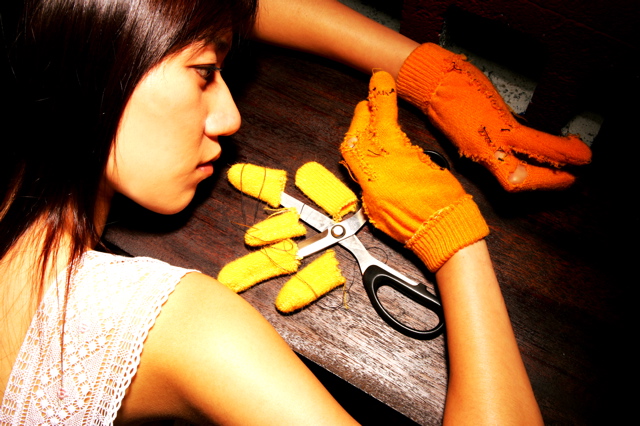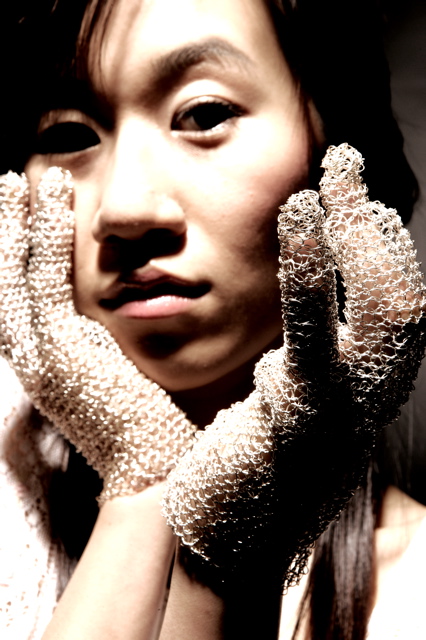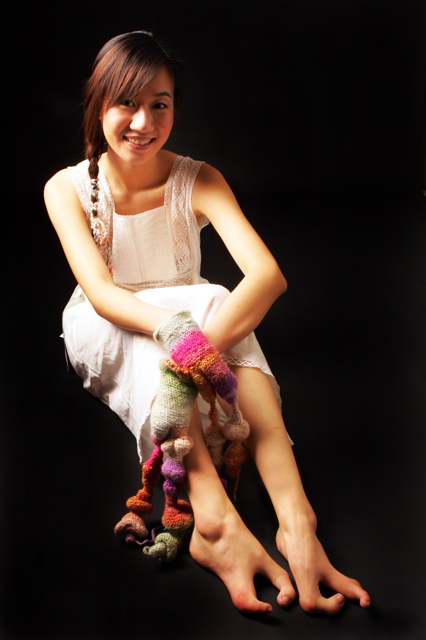
Sandie is a young woman who has recently graduated from art school. She was born with limb differences.
The following article is based on an in-person conversation and emailed questions that she answered.
Background
Sandie or Chun-Shan lives and works in Chicago as a visual artist. The following article was based on a "virtual interview" (she sent us answers to questions via email).
Sandie is originally from Taiwan and has both upper and lower limb differences that are congenital.
Sandie holds both a BFA and a MAAT (Master of Arts in Art Therapy) from the School of the Art Institute of Chicago, with an emphasis in metalworking and fiber and material studies. While in the MAAT program, she worked with people who have developmental and/or physical disabilities. Sandie uses art-making as a way to raise social awareness, and to re-evaluate disability labels and the beauty standards in society.
Artist’s Statement
I was born with two fingers on each hand and two toes on each foot. As a child, I felt powerless and fearful when confronted with people’s negative reactions to my body. In my recent adult life, I have made a series of body adornments to explore my memories of these social interactions that were focused on the appearance of my body. I use the process of making the adornments, as well as the produced objects, to reconnect with the fears of my inner child and to address my need for psychological self-protection. To me, art-making is about self-expression, identity exploration, healing and empowerment.
In my work, I examine the potential of art to address the relationship between the body and social standards pertaining to beauty and ability. As I present my artist identity in the foreground, rather than my identity as a person who has a difference in my physical condition and who has been described as physically disabled, I intend to challenge the viewer to engage in a more nuanced and intentional process of seeing art and the human body.
In the future, I plan to make more body adornments as art objects for myself and for or with other people, who have unique bodies—bodies that need to be adorned, but the mass production in the store could not accommodate such special bodies/needs (who makes gloves for people who have two fingers?). I look forward to collaborating with other women and young children with physical differences, and making art together as a way to tell our life stories.
 Sandie's Interview
Sandie's Interview
Q: What is the type/cause of your limb differences? How have they affected your life in a positive way?
A: I inherited my limb differences from my father--“split hand/foot malformation."
Having limb differences has been a positive experience for me because I have been able to solve “problems" (the problems in other so-called 'normal' peoples' eyes) with my hands creatively. I joke about how it takes less time for me to trim my nails, and I should get a better rate for a manicure and pedicure. My differences have allowed me to respect other people’s differences (race, culture, physical, etc) and to see how beautiful it is to be different. Honestly, within my family, having my limb differences had not brought many positive experiences until recent years, when I begun learning more about myself through art therapy.
Q: How has having limb differences affected your life in a negative way?
A: Having limb differences has been a negative experience for me because I’ve been seen and treated as someone who is “abnormal,” “disabled*,” “less capable, ” or “who needed to be fixed,” etc.
I grew up in a culture, where I learned to hide my hands and think that I am really out of the norm. The societal impact, beauty standards amd value judgments for people who have differences or who have disabilities certainly have influenced my family and I deeply. To name a few…all my achievements could potentially be considered as “oh, she overcomes her difficulties despite having two fingers!” While the way I see it, I am simply doing my job and do not see that any difficulties exist (my hands can always be the main “cause” for anything to happen…..good or bad).
 People seem to expect people who have physical differences, or some other sort of challenge, to overcome everything in life. And then they can say, “look, she is brave, and she is meeting our/the normal standards!”—I see it as a very selfish and unfair unspoken idea among “normal-people.”
People seem to expect people who have physical differences, or some other sort of challenge, to overcome everything in life. And then they can say, “look, she is brave, and she is meeting our/the normal standards!”—I see it as a very selfish and unfair unspoken idea among “normal-people.”
A lot of times, I feel that I have to be very brave and make things nice and perfect, otherwise, my failures and mistakes may be seen as the results of my physical differences.
Having a sibling, that is to say-- me, who has physical differences like our Dad, was hard for my sister. I was seen as someone, who gets more attention, love and care. (My sister has five fingers on each hand, and my physical appearance may had caused her to believe that it was her fault that I was different, when she was young.) People would get scared when they saw me, and I’ve received “ahhhh…s” and screams…People let me know that I am being considered as the “Other” with their body language and especially with their eyes (stares and stunned looks).
In Taiwan, my country of origin, tsain-zhang (disabled-hindered) or tsain-chi (disabled-ill) or tsain-chu (disabled-short of) are the most common words used to describe people with congenital or later acquired physical differences and disabilities.
Q: What are some emotional skills you have developed to help you with your upper limb difference(s)?
A: I have always told myself that “it’s okay, everyone has curiosity….you have curiosity, too…” and sometimes talked myself into “it’s all in your head… it’s all in your head…nobody is watching you…” I taught myself to forgive, and keep all the fears to myself (I only discovered that these feelings are called “being scared” until recent years). Now, I give myself permission to be not okay with the insensitive questioning and looks; I empower myself to say “no, I refuse to be treated like I was an object instead of a person” by making art about different unbearable situations. (I feel that I was taught not to challenge the tradition and need to be respectful to others in my culture; as a result of it, I did not think that it was okay to respond to these insensitive responses from the strangers.)
Q: Are there things that you would like to do now that you feel you cannot do because of your limb differences?
A: I don't have a lot that I can't do as a result of my limb differences. No….not really…except, when I get lazy, and I just don’t do it…(hee hee…) that’s the only time that I order people around (but it does not happen a lot, either!) (who doesn’t have some lazy moments?!)
Q: Are you more or less willing to try new things because you have upper limb difference(s)?
A: I'm naturally a perfectionist and a little bit tentative about new adventures, like I would not try bungee-jumping and some of the roller-coaster rides…..why? I am so chicken when it comes to these dangerous (for me) acts! (I was born in the rooster year…I wonder if that had anything to do with it?…As you can see, it does not have anything to do with my limb differences).
I am very willing to try new things, especially, when it requires complicated and fine motor skills. For example, sewing (making stitches), untying very tight knots in a rope and metalworking. I guess…..a part of me is very obsessive and compulsive for certain things. I also think that my willingness or desire to try new things (again, especially things which demand lots of fine motor skill coordination) have to do with how often other people have made assumptions about me. For example, things like “Oh, she can’t because of her hands.” I want to make things work and show “Oh, yes, I CAN!”
Q: How do you handle issues of personal grooming? We want to build a community of women with upper limb differences who can trade pratical advice and questions.
A: Hum…I have not monitored myself and see how I handle personal grooming…I have been doing it naturally…I can show you how I take care of things, and maybe you can do the description for me?
Q: What are areas of life that you find particularly challenging?
A: My mind….because I think too much!
Q: What do you feel you have mastered?
A: Being a master of myself-- sometimes I cry and get emotional, I can easily be moved by beautiful things (my definition of beauty is not limited to things that look pretty visually…the beauty of life for me includes seeing a man dancing, listening to a client's feelings without using words, a warm hand holding my hand, and knowing that these hands do not judge me…also witnessing how my grandmother complains about her bad luck, which caused a half dozen of the family to be born with a physical flaw (in her eyes) because she, too, hopes the best for her children.
Q: Is there any advice you would share?
A: It’s only beautiful to be who you are.
It’s okay to cry when you need to (or when you feel different from others)…being brave means giving yourself permission to be weak and fragile at times…inspite of the number of limbs or digits you have….it’s just a part of growing up and learning to take care of yourself.
Q: Do you wear a prosthetic? Why or Why not?
A: No. Once a doctor had suggested when I was young. I was fully capable of using my hands with scissors and chopsticks, etc. I did not see the need of a prosthetic and felt that a prosthetic was fake, not a real part of me. The only purpose for having the prosthetic would be for aesthetic reasons, according to the doctor (“You can be the same like everyone else! Other people wouldn’t see your two fingers!”) Today, I still don’t see a need for getting a prosthetic for myself.
Q: If you choose to wear a prosthetic what type do you use?
A: Larger breasts? Hahahaaa…….(just kidding!) Nope, no prosthetic is needed.
Q: Please describe five things you like about yourself.
A: (1) I like babies, kids and art making.
(2) I am sensitive and loving and I love to help people.
(3) I am willing to give myself permission to admit and to know that I don’t always have to be brave and strong.
(4) I appreciate what I have and the people, who love and care for me.
(5) I like how I believe that all bodies need to be adorned, and I like my dream of making body adornments for unique bodies.
Q: What do you tell people about your limb differences?
A: I was born like this (or I was born with two fingers.)
Q: Do you feel social interactions (i.e., dating, school, work, friendships, etc.) are more difficult because of your limb differences?
A: In general, people in the States seem to be more accepting of other people’s differences. In Taiwan, my home country, it is even more difficult to be different. I do find myself wondering about dating sometimes.
Contact Information:
To get in touch with Sandie, please email her at cs4a@cs4a.org